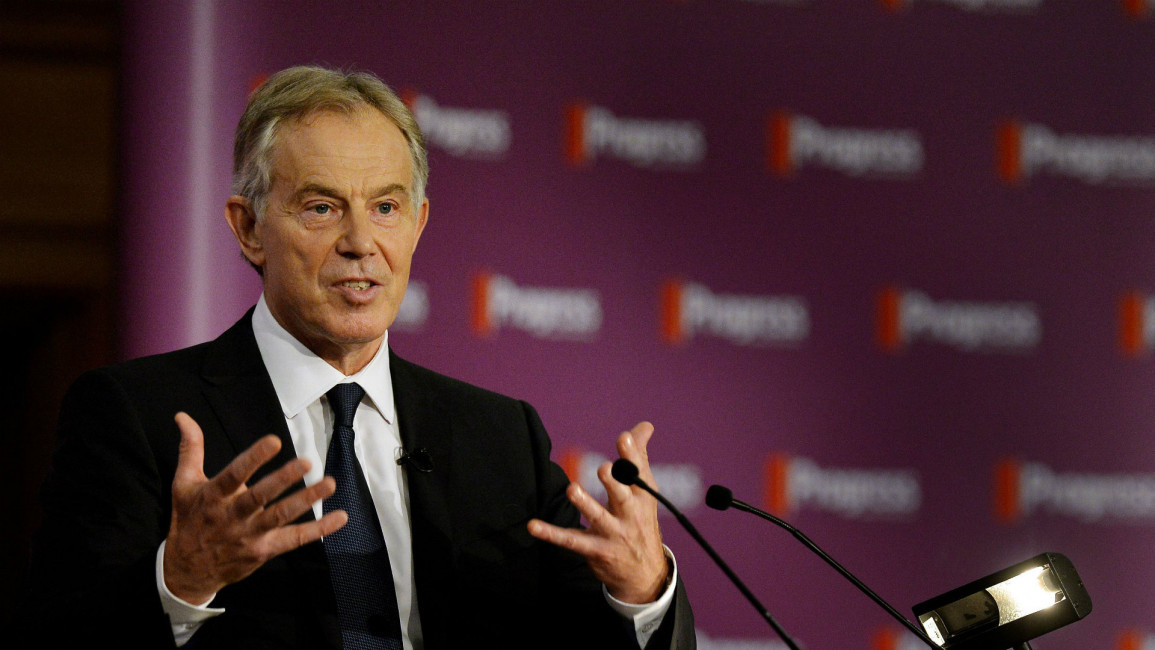Tony Blair to head European anti-semitism group
Tony Blair to head European anti-semitism group
Former British prime minister announces role as chairman of the European Council on Tolerance and Reconciliation a week after resigning as the Quartet's Middle East Peace envoy.
3 min read
Blair said Europe still saw 'hideous acts of violence' against Jews [Getty]
Tony Blair has been appointed as chairman of a pan-European body that fights anti-semitism and campaigns for the criminalisation of holocaust denial.
The former British prime minister's move to the European Council on Tolerance and Reconciliation, or ECTR, comes a week after he resigned as the peace envoy of the Quartet on the Middle East.
In a statement on Thursday Blair said: "The work they [the ECTR] are doing is crucial, because despite our best efforts to build a consensus around tolerance in Europe we still see injustice, discrimination and hideous acts of violence on the continent."
| It is not religion or faith per se that causes or foments conflict. It is the abuse of religion |
In an article for the UK newspaper the Times, Blair said that he would campaign across European capitals for the implementation of the recommendations of a report from the council, which proposes legal parameters for tolerence, including greater power for judiciaries to prosecute hate speech, lower barriers to what constitutes incitement to violence and criminalising Holocaust denial.
Many of the recommendations reflect legislation Blair tried to implement when he was serving as prime minister, 1997-2007, which elicited challenges on the grounds of infringements on civil liberties.
The article co-written with Moshe Kantor, the president of the ECTR and of the European Council of Jews, said that 2014 was the worst year in the past decade for violent anti-semitic incidents while drawing parallels to other periods in modern history where Europe experienced both economic malaise and rising extremism.
"There have been three points in the past 100 years when annual GDP growth in Europe fell below one percent: first in 1913, just before the First World War, second in 1938, just before the second broke out and third, in 2014. Economic decline fuels instability and we know these concerns are being felt across the world."
The war in Syria is alluded to in the opening paragraphs as a source of rising extremism and intolerance. Blair states: "It is not religion or faith per se that causes or foments conflict. It is the abuse of religion, which then becomes a mask behind which those bent on death and destruction all too often hide."
Lessons learned from the Northern Ireland peace process are mentioned in a tip to one of Blair's major political victories while in office, the 1998 Good Friday Agreement.
A controversial legacy
Blair's new appointment comes on the heels of his resignation as special representative of the international quartet – the UN, US, EU and Russia – on the Middle East.
During his time in this role Blair come under increasing scrutiny for his expansive business interests in the region, his failure to deliver any tangible results and grievances among the Palestinian community for his perceived closeness to the Israelis.
The Palestinian Authority's former chief negotiator Nabil Shaath said Blair had "achieved so very little because of his gross efforts to please the Israelis".
The legacy of the Iraq and Afghanistan wars launched during Blair's premiership also undermined his standing as a independent broker in the region.
The new post at the ECTR intersects with the work already done by the Tony Blair Faith Foundation, which he created to "counter extremism in all six leading religions".
As well as lobbying politicians and law makers the ECTR also works in schools and universities around Europe to "encourage tolerance and reconciliation", through lectures, workshops and academic studies.
The ECTR was established in October 2008 by Kantor and Aleksander Kwasniewski, a former president of Poland, but its conception dates back to the International Stockholm Forum on the Holocaust organised by the Swedish government in January 2000.



